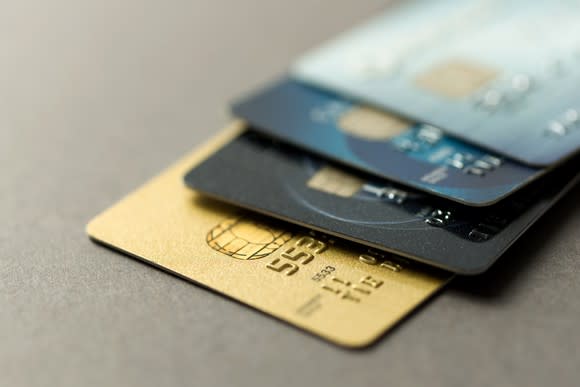13% of Americans Think Credit Card Debt Is the Good Kind to Have
In case you didn't hear, credit card debt reached an all-time high last year, and the average household now owes a whopping $16,000. But that's not the worst news out there on the credit card front. In a recent CreditCards.com survey, 13% of Americans said that credit card debt is actually the good kind of debt to have. And that's an alarmingly skewed line of thinking.
Good debt versus bad debt
Since a sizable chunk of the population clearly has no clue as to what constitutes good versus bad debt, it's time for a refresher. Good debt is typically defined as debt with the potential to bring you value or earn you money in the future. One common example of good debt is mortgage debt. When you take out a mortgage to finance a home, you're getting an opportunity to build equity in that property. Then, if in, say, 30 years from now, that home is paid off but has also increased in value, you'll get to pocket those gains if you sell it. Therefore, mortgage debt can actually make you money, even if it costs you money along the way.

IMAGE SOURCE: GETTY IMAGES.
Another prime example of good debt is student loan debt. When you obtain a college degree, you increase your earning potential for life, which makes the interest you're forced to pay on those loans worth it in the long run. Consider this: In 2016, full-time workers with college degrees earned a median of 67% more than those with just high school diplomas. Furthermore, while the median income for 30- to 34-year-olds with a bachelor's degree is an estimated $40,944, it drops to $31,807 for those who only graduated high school. In other words, student loans have the ability to deliver a solid return on investment, thus making them the good kind of debt to have.
Then there's auto debt, which is sort of a gray area. The reason? Vehicles tend to depreciate in value over time, so they typically can't make you money directly. However, if having access to a vehicle enables you to travel to work, you'll benefit by virtue of having the opportunity to earn an income.
On the other hand, if there's one shining example of bad debt, it's credit card debt. Bad debt won't help you earn money or provide any sort of return on investment. Rather, it'll cost you money and nothing more.
Credit card debt is particularly evil because of the way it can escalate quickly. Once you start carrying a balance on a credit card, you'll begin to accrue interest, which will then compound on a daily basis. In other words, you'll be charged interest not just on your principal balance, but on your interest, until you manage to pay that debt off. Worse yet, credit cards carry some of the highest interest rates out there. Whereas you might pay something like 4% for a mortgage today, a credit card company can easily charge 20% interest or more. And that's basically a recipe for disaster.
Be careful with credit cards
Though credit card debt is unquestionably the bad kind to have, it doesn't mean that credit cards themselves are evil. Quite the contrary -- when used wisely, credit cards can earn you rewards points, offer purchase protection, and help you lock in the lowest prices on the things you're buying. Credit cards can also help you build credit, which can make borrowing cheaper for you on a whole. Just be careful not to rack up a balance on your credit card, because once you do, you'll likely have a hard time paying it off. Furthermore, carrying too high a credit card balance can actually hurt your credit score, thus making good debt costlier for you than necessary.
So there you have it: Credit card debt is the kind you don't want. And the sooner you realize that, the less likely you are to throw your money away needlessly.
More From The Motley Fool
The Motley Fool has a disclosure policy.
